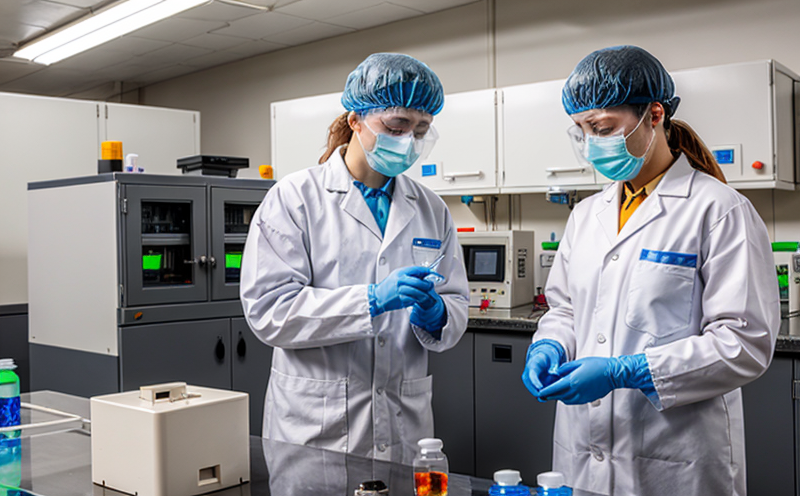EN 19711 Glycidyl Esters Profiling in Confectionery Products
The European Standard EN 19711 establishes a standardized method for profiling glycidyl esters in confectionery products. This test is crucial for ensuring the safety and quality of food items that may be affected by the presence of these potentially harmful compounds.
Glycidyl esters, also known as epoxy fatty acids, are formed during certain industrial processes like hydrogenation and can pose risks to human health if present in excessive amounts. The standard outlines a procedure for quantifying glycidyl esters using gas chromatography coupled with mass spectrometry (GC-MS), which is the most reliable method for this analysis.
The testing process involves several critical steps. Initially, samples from various confectionery products are collected and prepared according to strict protocols. Proper sample preparation includes thorough homogenization, extraction, and cleanup phases to ensure accurate results. Once the sample is ready, it undergoes GC-MS analysis, where the presence of glycidyl esters is detected and quantified.
The results from this testing are essential for quality managers and compliance officers as they provide a clear picture of the glycidyl ester content in their products. This information can help them make informed decisions regarding product formulation adjustments to ensure compliance with regulatory standards, thereby protecting consumer health and maintaining brand reputation.
For R&D engineers, this test offers valuable insights into potential sources of contamination and opportunities for process optimization. It allows them to identify areas where improvements could reduce the formation of glycidyl esters during production processes. This is particularly important in confectionery manufacturing, where the quality and safety of the final product are paramount.
The standard also includes acceptance criteria that define the permissible levels of glycidyl esters based on regulatory guidelines such as those from the European Commission (EC) and national food safety authorities. Compliance with these standards ensures that products meet both local and international requirements, enhancing market access and consumer confidence.
Scope and Methodology
The scope of EN 19711 is to provide a standardized procedure for the determination of glycidyl esters in confectionery products. The methodology detailed in this standard employs advanced analytical techniques to ensure precise and reliable results.
- Sample Preparation: Samples are collected from various points along the production line, ensuring a representative sample is taken. This involves thorough homogenization of the product followed by extraction using appropriate solvents.
- Cleanup: The extracted solution undergoes further purification steps to remove interfering substances before analysis.
- Analytical Technique: Gas chromatography coupled with mass spectrometry (GC-MS) is used for its high sensitivity and specificity in detecting glycidyl esters. This technique allows for the accurate quantification of these compounds even at very low concentrations.
The standard specifies detailed procedures for each step, ensuring that laboratories conducting this test follow a consistent methodology across different facilities. This consistency is crucial for obtaining comparable results internationally and maintaining the credibility of the testing process.
Why Choose This Test
Selecting EN 19711 Glycidyl Esters Profiling in Confectionery Products is essential for several reasons, particularly for businesses operating within regulated food sectors. Compliance with international standards like this one not only ensures product safety but also enhances market competitiveness and consumer trust.
By choosing our service, you gain access to state-of-the-art laboratories equipped with the latest GC-MS technology. Our team of experts uses these resources to provide accurate, reliable, and consistent results every time. This consistency is crucial for maintaining a high standard of product quality throughout production runs.
The test helps companies stay ahead of regulatory changes by providing early detection of potential issues. It allows them to take corrective actions promptly if glycidyl ester levels exceed acceptable thresholds. Additionally, it supports continuous improvement efforts within R&D teams by offering insights into process inefficiencies and areas for optimization.
Consumer safety is a primary concern in the food industry, and meeting or exceeding international standards demonstrates a commitment to excellence. Our service ensures that your products meet these stringent requirements, thereby enhancing their reputation and market acceptance worldwide.
International Acceptance and Recognition
- European Union: The standard is widely accepted across the European Union as part of its food safety regulations. It is used by regulatory bodies to enforce compliance with glycidyl ester limits in confectionery products.
- American Food Safety Authorities: While not specifically referenced, similar standards are recognized and utilized by agencies like the FDA (Food and Drug Administration) for assessing risks associated with glycidyl esters.
- Asian Markets: Many Asian countries have adopted or are in the process of adopting similar standards to ensure product safety. Compliance here can significantly enhance market access opportunities.
The global nature of the food industry means that compliance with international standards like EN 19711 is increasingly important for businesses looking to expand their reach beyond local markets. By adhering to these standards, companies demonstrate their commitment to quality and safety, which is crucial in gaining acceptance from diverse regulatory bodies worldwide.





